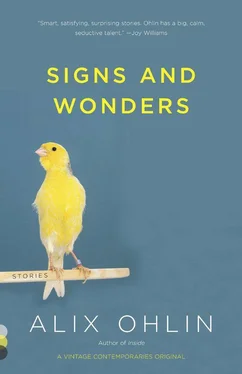Alix Ohlin - Signs and Wonders
Здесь есть возможность читать онлайн «Alix Ohlin - Signs and Wonders» весь текст электронной книги совершенно бесплатно (целиком полную версию без сокращений). В некоторых случаях можно слушать аудио, скачать через торрент в формате fb2 и присутствует краткое содержание. Год выпуска: 2012, ISBN: 2012, Издательство: Random House, Inc., Жанр: Современная проза, на английском языке. Описание произведения, (предисловие) а так же отзывы посетителей доступны на портале библиотеки ЛибКат.
- Название:Signs and Wonders
- Автор:
- Издательство:Random House, Inc.
- Жанр:
- Год:2012
- ISBN:9780307948649
- Рейтинг книги:3 / 5. Голосов: 1
-
Избранное:Добавить в избранное
- Отзывы:
-
Ваша оценка:
- 60
- 1
- 2
- 3
- 4
- 5
Signs and Wonders: краткое содержание, описание и аннотация
Предлагаем к чтению аннотацию, описание, краткое содержание или предисловие (зависит от того, что написал сам автор книги «Signs and Wonders»). Если вы не нашли необходимую информацию о книге — напишите в комментариях, мы постараемся отыскать её.
Signs and Wonders — читать онлайн бесплатно полную книгу (весь текст) целиком
Ниже представлен текст книги, разбитый по страницам. Система сохранения места последней прочитанной страницы, позволяет с удобством читать онлайн бесплатно книгу «Signs and Wonders», без необходимости каждый раз заново искать на чём Вы остановились. Поставьте закладку, и сможете в любой момент перейти на страницу, на которой закончили чтение.
Интервал:
Закладка:
To say that what she felt, sitting next to him, was complicated would be more than understatement. She believed, with all her heart, that Terry didn’t want her there; that he had long hated her just as she had hated him; that her presence had grown to be a burden, even the sound of her chewing, or the rhythm of her steps, inconsequential things that only married people can hate. It was as a gesture of kindness that she didn’t read to him, because surely being in a coma doesn’t erase the irritation caused by your wife’s voice. With all the troubled intimacy of their twenty-six years together she knew this. And this same knowledge also bound them, making her come back every single day to visit this trussed chicken who had been her lover and her companion and her enemy. Because she was all he had left.
At home that night, a little tipsy, she called Dave. “It’s Kathleen,” she said.
There was a pause.
“Terry’s wife,” she said.
“Oh, right,” he said. It was ten o’clock, and he also sounded drunk. “Everything okay? I mean, how’s Terry?”
“He’s the same. Why haven’t you been to see him? You’re his best friend.”
There was another pause. “I am?” he said.
“Jesus,” she said. “Listen, I have to ask you something and I need you to be honest. For Terry’s sake.”
She had a memory of Dave, back when she and Terry still had parties, slipping a bottle of vodka to their son and shrugging afterward, saying that the longer you kept it away, the worse kids wanted it. They found poor Steve at three in the morning, puking in the park, and he swore he’d never again touch alcohol. Which was true, actually, he’d only snorted drugs, so maybe Dave wasn’t completely off base.
“Sure, anything,” he was saying now.
“Was Terry having an affair?”
“Oh, Kathy,” he said. “No.”
“I’m not asking for the reason you think I am,” she said. “I’m not mad. I just thought that if he was, he’d probably want her in the room, do you know what I mean? Instead of me? So I thought it would be nice to invite her or whatever. As a …” She stumbled to find the right word, then her mind seized it, brilliantly: “A mitzvah.”
Dave, like Terry, was Jewish; Kathleen was Irish Catholic, though the question of religion was one they had always resolutely ignored. But Dave, right now, didn’t sound pleased to hear her use the word mitzvah. In fact, he sounded sober and annoyed. “There’s no girl, Kathy. Get some sleep.”
She told him not to call her Kathy, but he’d already hung up.
The notion of an affair preoccupied her for some time. In truth she suspected Fleur — nothing else, she thought, could explain her relentless visitation — yet there wasn’t anything in their conversations to support it; Fleur gave no indication of knowing anything more about Terry’s life than Kathleen did, and she had little curiosity about him, either. She only wanted to talk about Kathleen, her interests and opinions, her mental and physical health. She kept insisting that Kathleen had a life, against all evidence to the contrary. It was, frankly, more than a little weird.
Summer came, and Fleur left town for two weeks to visit her family in Wisconsin. Kathleen had been looking forward to this Fleur-less time for ages. Finally she would have some peace. She wouldn’t watch any DVDs or read the newspaper or knit. She would sit around in her pajamas and be miserable without interruption or witness.
It was an unpleasant surprise, then, to discover that she missed Fleur. She felt like she was going out of her mind, in fact. The days were formless, chaotic. Her visits to Terry seemed hollow because there was no one to report to about them. Her evenings collapsed into drinking and endless crappy television — she was appalled by how much of it Terry used to watch; it was such an obvious cry for help — and she woke up at three a.m. sobbing with loneliness and despair.
Dear God, she thought. Fleur Mason, whom I hate, is my best friend.
When Fleur got back to town, she came over the next day. Kathleen had cleaned the house, baked muffins, and brewed coffee. Fleur took it all in stride. She described her vacation, then asked Kathleen about her family.
Instead of answering, Kathleen said, “I have to tell you something.”
Fleur set her muffin down. “Shoot,” she said.
“I was the one who took your bird out of its cage,” Kathleen said. Even as she said it she wasn’t sure why she was confessing. To kill the friendship or strengthen it: both urges commingled in her mind, her heart.
“I know,” Fleur said.
“You do?”
“You’re the only one with a key to the office. Except the custodian, and he loves birds. He keeps pigeons at home, did you know that? I also know you didn’t want to hire me in the first place, and then tried to terminate my contract in the second year.” This was true, though Kathleen had thought it was a secret. “And I know you told people my teaching was terrible and that you didn’t want me to get tenure.”
“If you know all that,” Kathleen said slowly, “why are you here?”
She steeled herself for what she was about to hear, the words like grit that would rub her skin raw. Because I get to pity you. And that is my revenge.
Fleur laughed her too-long laugh. “Just because you don’t like me,” she said, “doesn’t mean I don’t get to like you.”
“What the hell does that mean?” Kathleen said grumpily.
“You’re smart and sensible. I look up to you. I figured whatever issues you had with me, eventually you’d get over them, if I didn’t let myself get distracted by the other stuff.”
“I don’t know what to say,” Kathleen said.
“And anyway, the custodian found Harry, so no harm done.”
“Harry?”
“My parakeet. He found Harry in the men’s room and trapped him for me. As I said, he has pigeons and knows about birds. So he called me and I brought Harry home. He’s fine.”
“Everybody thought he was gone. They said you were heartbroken.”
“It doesn’t hurt,” Fleur said mildly, “to let people feel sorry for you every once in a while.”
The next day, at the hospital, Kathleen didn’t play any Shakespeare. She opened the blinds — Terry loved the sun and wanted to retire to Florida and play golf all day, after the motorcycle trip to South America — and sat next to the bed. The view was of the parking lot, where a few spindly trees played host to crows and sparrows, but at least the light was bright. She looked at her husband. The bandages had been removed, and his skin was perversely healthy, even pink. On his hands were scabs, raised like tattoos on his knuckles. His beard had grown but the nurses kept it trimmed, so if anything he looked more professorial than ever. She put a hand on the coarse crinkle of hair on his head.
“Oh, Terry,” she found herself saying. She’d known him for so long that this familiarity, however abrasive it had become, was inextricable from love. She felt so badly for him, for everything he’d been through — a Niagara Falls of sorry that crashed through her in a torrent, flooding her voice with tears. “My heart, my love.” She touched his cheek, his shoulder, the pale skin beneath his papery gown. “Come back to me, love. Come back, please, please, come back, please, please, please.”
She spent the night at the hospital, in the chair by his bed, and when she woke up in the morning, the crows cawing outside, she saw that his eyes were open and he was looking at her expectantly, as if she were the one who had just spent so much time asleep.
It had been three months, but to Terry it was as if no time had passed. He said he felt like he’d woken up from a particularly long nap. Of the accident itself he had no memory whatsoever; the last thing he could remember was buying lunch at McDonald’s and eating french fries as he drove home. Within three days of awakening he was released from the hospital, though Kathleen drove him back every day for physical therapy for his atrophied muscles and cognitive therapy for his atrophied mind.
Читать дальшеИнтервал:
Закладка:
Похожие книги на «Signs and Wonders»
Представляем Вашему вниманию похожие книги на «Signs and Wonders» списком для выбора. Мы отобрали схожую по названию и смыслу литературу в надежде предоставить читателям больше вариантов отыскать новые, интересные, ещё непрочитанные произведения.
Обсуждение, отзывы о книге «Signs and Wonders» и просто собственные мнения читателей. Оставьте ваши комментарии, напишите, что Вы думаете о произведении, его смысле или главных героях. Укажите что конкретно понравилось, а что нет, и почему Вы так считаете.












